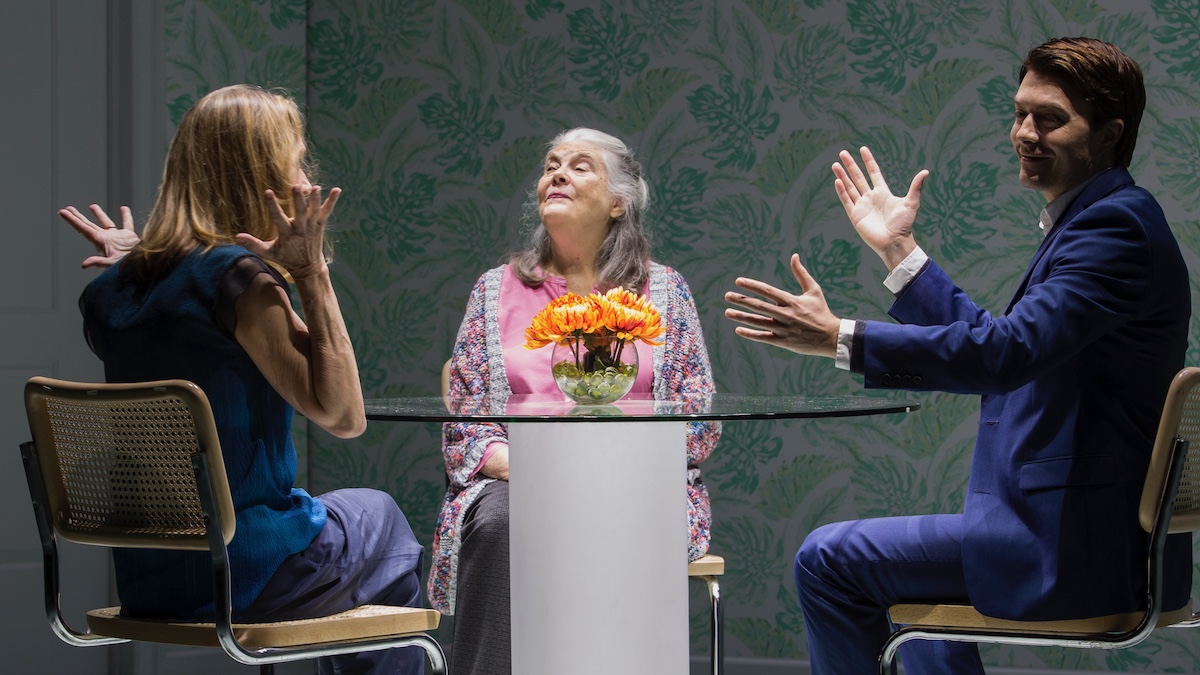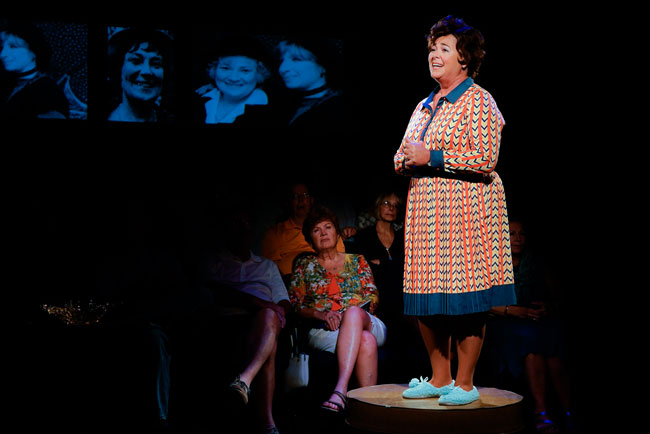
From the beginning, Erma Bombeck: At Wit’s End was well received. After Margaret Engel saw Florida Rep’s January 2016 production of A.R. Gurney’s The Cocktail Hour, she sent her new script to Producing Artistic Director Robert Cacioppo, recommending I play the role of Erma Bombeck. I confess my knowledge of Erma only extended to name and face recognition, but during my first read I laughed and wept and identified with her familial witticisms.
Even though her work spanned a particular period in American life, the stories and anecdotes were timeless – and I connected to them easily. My background was similar to those of her children; I was raised in the 1950s and 1960s in Midwestern suburbia. My mother, secure and content in her marriage and child-rearing, reflected the stories written by Erma. I also had an advantage, having raised two children to adulthood.
The next step was getting the play on the radar of our Producing Artistic Director. Recommending and choosing a play for a regional theater is as daunting as getting a bill passed by Congress. It is a tremendous investment for the theater, and each play is seriously vetted to make sure it meets the theater’s standards. Robert Cacioppo selects plays after grueling consideration, much discussion among staff leaders, and careful analysis with regard to the Florida Rep mission and the overall trajectory of the season he’s building. Robert also happens to be my husband. How fortuitous that I could persuade him to relax on a Sanibel Island beach along the Gulf of Mexico one spring afternoon – a truly rare event. There, free from interruptions, I gave him a private reading of Erma Bombeck: At Wit’s End.
After laughter and tears, his immediate response was, “Let’s do it.” The charge was made and the process began. Erma Bombeck: At Wit’s End was slipped into Florida Rep’s 19th season marketing campaign in early 2016, and in Robert’s curtain speeches announcing the title as part of the 2016-17 Season, Erma’s name drew “ooohs” and “aaahs” from audiences. Our Midwestern audience members – many of whom have relocated or winter here – proved they would surely relate to this play. Early on in the subscription renewal campaign, the first few weeks of the run were filling up.
No going back now. I was going to open Florida Rep’s 19th season…in my first one-woman show. After working professionally and playing one hundred or so roles in the past thirty years, I find nerves of steel weaken, flexibility lessens, and brain capacity has limits. In short, we age. My retaliation is to redirect any possible psychological sabotage, maintain exercise, and jump into script preparation. I had just finished playing the title role in Steven Dietz’ Becky’s New Car. The opportunity to address and interact with the audience on stage for an extended period gave me a glimpse of the challenge of tackling a one-character show. Actor friends who had performed solo shows reassured me that it could be done.
Without a doubt, I attribute my physical strength, stamina and focus to my yoga practice. I also systematically plot out time to memorize. Besides feeling more relaxed and in control at the beginning of rehearsals, the other advantage to memorizing early is that the words have greater, truer value. Living with the lines in your head through everyday activities and experiences melds them to your own personality. They become embedded and flow naturally as they are expressed. I begin to relate to things differently with a new perspective; that of the character. I’ve enjoyed learning my lines this way. It seems self-indulgent, almost relaxing, meditative; a place to escape and be productive at the same time.
Next was Robert assembling the team (director, designers), and designing the space for staging. Robert was very sensitive to who would direct me. As it turns out, the choice was perfect: Michael Marotta, a close friend whom I had acted with and been directed by many times. Robert’s many collaborations with Michael go back to their college days, and Michael had very successfully directed our previous season-opener, another one-woman-show, I Loved I Lost I Made Spaghetti, adapted by Jacques Lamarre from the book by Giulia Melucci. (Michael also attended our wedding. It was a good fit.)
Michael was open to all of my impulses and familiar with all of my idiosyncrasies – and I his. Michael knew Erma Bombeck’s work through his own mother’s devout reading, and in the alley-designed playing space, he sewed together the scenes and stories with unscripted projections and music. From the beginning of rehearsals we had the great advantage of being in the theater with the nearly-completed set. Once rehearsals started, the solitude in memorizing became a group effort of bringing Erma’s story to life. The At Wit’s End team, made up of seasoned Florida Rep ensemble members and a number of young interns, enthusiastically performed their roles handling props, sets, lights, costumes/wigs, and prompting. They were a wholehearted reinforcement. I was lucky because early prep time, excellent direction and supervision, guaranteed full houses, and a compelling story served me well in my performance.
The playwrights, Allison and Margaret Engel, also journalists, seemed to have another purpose for telling Erma’s story. In a dramatic turn, Erma was transformed from a stay-at-home-mom, passively writing her column about her life in the suburbs, to an outspoken feminist on the road toting the ERA’s movement message. When I delved into Betty Friedan’s Feminine Mystique, which was referenced in the text of the play as a turning point in Erma’s life, I was clued into the essence of the play itself. It chronicled the plight of women through the 20th century, from Women’s Suffrage to the 1970s. Friedan’s explanation that women accepted inequalities as a standard built on tradition gave cause for Erma to take action. That ideology is used as a thread throughout the play. The premise of Erma returning from the past to speak to us today in order to make a difference brought the story to another level – especially because the run at Florida Rep coincided with the final weeks of the heated 2016 presidential election. To me, that was the force behind making the play relevant to younger audiences and valid for today.
Box office records were broken, with sold-out performances throughout the five week run. While backstage listening to the recorded Erma Bombeck introduction and the applause from the audience, I was aware of my responsibility to portray their remembrances of the real Erma nonstop for sixty-five minutes. However, the character also divulges things about herself that are not so familiar to our audiences. Through the action of daily chores, vacuuming, dusting, ironing, folding clothes, clearing and setting the table, and giving speeches, the audiences witnessed an ordinary housewife living an extraordinary life. They saw a true story with fairy tale inspiration with which everyone could identify, and the audiences were with me every step of the way. Their laughter, nods of agreement, recognition of their own experiences, and sober silences were all affirmations I was doing my job in giving new life to Erma’s story, and honoring her memory and great work.
Erma Bombeck: At Wit’s End was a financial and critical success for Florida Repertory Theatre, and her story resonated with our audiences. It is an important story of how one woman’s daily life inspired millions of women across the country, and how her work for equal rights helped to move this country forward. What’s more, she did it with grace, dignity, and above all, humor. As an artist, I mark it as one of my greatest experiences.
Photos Credit: Nick Adam’s Photography / Nick Adams.
To purchase a copy of Erma Bombeck: At Wit’s End click here, and to learn more about licensing a production, click here.

Plays About Technology

Newly Available for Licensing – December 2025 (US)



